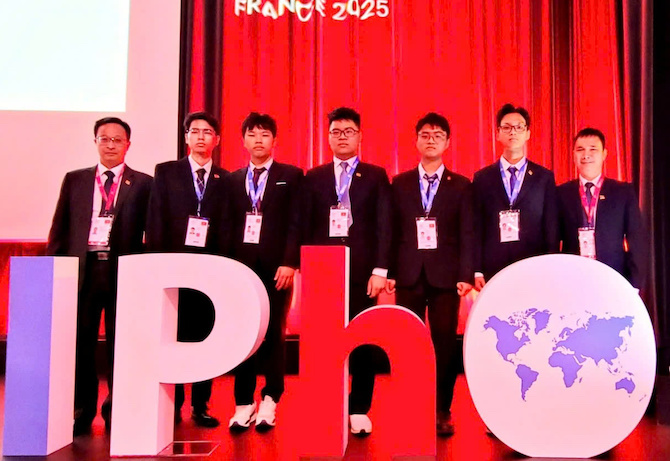Among them, Nguyen Luong Thai Duy, an 11th grade student at Hanoi - Amsterdam High School for the Gifted, Hanoi, won the Gold Medal, ranking 7th out of 298 contestants.
Nguyen Huu Thanh, a 12th grade student at Tran Phu High School for the Gifted, Hai Phong, and Bui Hoang Dai Duong, a 12th grade student at Quoc Hoc Hue High School for the Gifted, won a Silver medal.
Le Hoang Kieu Anh, a 12th grade student at Hanoi - Amsterdam High School for the Gifted, Hanoi, won a Bronze medal.

This achievement has put the Vietnamese team in the group of 10 countries with the highest total score.
The 36th International Biology Olympic Festival (IBO) in 2025 will be held in the Philippines from July 19 to 27.
IBO 2025 with the participation of 81 delegations from 81 countries and territories (including 3 observers), and 298 contestants.
IBO 2025 has two official exam days: One day of the theory exam with 2 exams, each 180 minutes and 4 laboratory exam rooms, each 90 minutes. In fact, due to more time to prepare samples and equipment, the candidates took the practice exam continuously for 12 hours, from 12:30 on July 22 to 0:30 on July 23.
The two theoretical papers have 85 questions and topics revolving around global practical issues such as environmental pollution, green growth, carbon neutrality, climate change prevention, community disease prevention, diagnosis and treatment of some basic diseases according to the principles of accurate medicine.
There are four practice exam rooms: Biomedicine, with the ability to perform electrocardiogram interpretation, blood and urine biochemistry testing, X-ray image interpretation, antibiotic testing and selection for common medical cases.
phanological and cell biology with the capabilities of analyzing genes, proteins, measuring the activity of molecules in cells to identify and predict the tien hoa of pathogens that cause parasitic diseases.
Ecology and systems of study, requiring analytical and classification skills to serve the identification, supervision, and development of sustainable fisheries and aquaculture activities.
microbiology, with skills to classify and research the development process of bacteria and fungi that cause food poisoning in humans.











